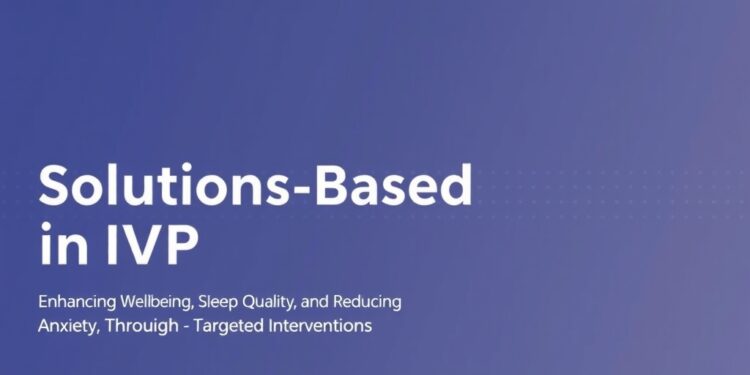
In recent years, the increasing prevalence of in vitro fertilization (IVF) has spotlighted the emotional and psychological challenges that many women endure throughout the process. A groundbreaking study conducted in China has now introduced a promising psychological intervention, utilizing a solution-focused approach designed to enhance the overall well-being of women aged 35 or older who are navigating this complex journey. This innovative research aims to address the multifaceted challenges presented by fertility treatments, particularly focusing on improving critical areas such as sleep quality and anxiety levels.
The study, titled “Effect of solution focused approach on women aged 35 or over with in vitro fertilization-embryo transfer: A quasi-experimental trial,” highlights the critical role that psychological support can play in enhancing the success of IVF treatments. As many women undergoing IVF experience heightened levels of stress and anxiety, the need for effective psychological strategies becomes paramount. The researchers implemented a structured problem-oriented model, offering women clear intervention goals that could significantly impact their mental health during this trying time.
Employing a well-defined methodology, this trial involved a carefully selected group of participants who met specific criteria. The subjects, all women over the age of 35, represented a demographic notably impacted by fertility issues. By focusing on this age group, the study aimed not only to assess the efficacy of the solution-focused approach but also to contribute to the growing body of knowledge regarding optimal support structures for older women seeking assisted reproductive technologies.
Throughout the trial, participants engaged in a series of solution-focused therapeutic sessions that emphasized goal-setting and rapid problem resolution. This approach encouraged women to identify their strengths and resources, enabling them to navigate their IVF journeys with greater resilience and hope. By fostering an environment that shifted focus from problems to potential solutions, the study sought to empower women and mitigate the emotional burden associated with infertility treatments.
The findings of this research are both compelling and supportive of the ongoing conversation surrounding mental health in reproductive medicine. The preliminary results indicate marked improvements in sleep quality among participants, suggesting that the emotional turbulence often linked to fertility treatments could be alleviated through targeted psychological interventions. Improved sleep is particularly noteworthy, as endocrine functioning and overall health are integral to reproductive success.
Additionally, reports of reduced anxiety levels among participants point to the effectiveness of the solution-focused approach. Anxiety is a common issue, often exacerbated by the unpredictability of the IVF process. The trial’s data suggests that with appropriate therapeutic support, women can acquire coping strategies that significantly lessen their anxiety, leading to a more positive experience throughout their treatment cycles.
This study is a timely reminder of the importance of holistic care in IVF settings, emphasizing that psychological support is as crucial as medical interventions. The initial outcome highlights the need for ongoing research that will solidify the benefits of integrating psychological therapies with traditional reproductive treatments. Findings are expected to energize healthcare professionals to consider mental health strategies crucial components of fertility care.
An integral aspect of this research is the acknowledgment of external funding and support. The research was made possible by the backing of the First Medical Center of the Chinese PLA General Hospital. Importantly, the funders had no involvement in the study’s design, data collection, or analysis, ensuring the integrity and impartiality of the published outcomes. It is such transparency that fosters trust in scientific research, encouraging further exploration into the unmet needs of patients in reproductive health.
Moreover, this study paves the way for future trials focused on psychological interventions integrated into various medical procedures. With rising awareness around the psychological implications of infertility, the potential for developing tailored therapeutic models continues to grow. Future studies could expand on these findings by exploring how these strategies might benefit various demographics beyond women aged 35+, addressing a more extensive range of emotional and psychological challenges faced by patients seeking fertility treatments.
The importance of these findings cannot be overstated. As the landscape of reproductive medicine evolves, so too must the understanding of patient care. The integration of mental health strategies in IVF protocols stands to transform the approach to fertility treatment, ensuring that women are not only supported physically but are also bolstered emotionally during an often tumultuous experience.
The publication of these results in the esteemed journal PLOS One is a significant step in disseminating knowledge around this important topic. Acknowledging the hardships faced by women seeking IVF, such research plays a vital role in guiding healthcare practices worldwide, emphasizing the need to strive for a balanced treatment regimen that prioritizes psychological health alongside physical well-being.
In conclusion, this innovative approach to supporting women through IVF showcases the profound impact of incorporating psychological interventions within medical treatment paradigms. As researchers and practitioners continue to recognize the integral relationship between mental and physical health, the journey towards successful and compassionate reproductive care continues to evolve, armed with insights from groundbreaking studies such as this.
Subject of Research: The impact of solution-focused therapy on women undergoing IVF.
Article Title: Effect of solution focused approach on women aged 35 or over with in vitro fertilization-embryo transfer: A quasi-experimental trial.
News Publication Date: March 19, 2025.
Web References: 10.1371/journal.pone.0316771
References: N/A
Image Credits: N/A
Keywords: IVF, solution-focused therapy, psychological support, reproductive health, anxiety reduction, women’s health, infertility treatments, sleep quality.
Tags: anxiety reduction strategies for IVF patientseffective psychological strategies in IVFemotional challenges in in vitro fertilizationenhancing wellbeing during fertility treatmentsIVF psychological supportmental health during fertility treatmentproblem-oriented therapy for anxietyquasi-experimental study on IVFsleep quality improvement in IVFsolutions-based therapy in IVFstress management in IVFtargeted interventions for women over 35





